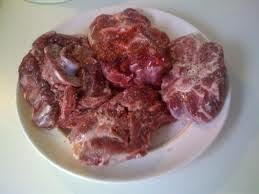But this post isn't just about kids eating their greens. What I find is that parents will tell their kids they need to eat their greens all the while shoving pizza in their own mouths. Besides the fact that no child is going to feel compelled to eat their greens simply because "they're good for you", when their parents are eating pizza for dinner, there's also the fact that parents seem to think they are immune to the need for greens, themselves.
But why is there such a fuss about greens? According to Dr Elson Haas, author of Staying Healthy With Nutrition, "The leafy greens are probably the richest in nutrients of any foods in the vegetable kingdom."
Greens balance out the healthy animal foods, like grassfed meats, organ meats, eggs, & raw dairy. Greens are cleansing foods, while animal foods are nourishing foods. Greens are good detoxers, which is vital and necessary for our immune system, and every cell in our bodies.
Here are some other benefits that we get from greens. They are:
- Full of vitamins
- Full of minerals
- Full of chlorophyll, which is the compound responsible for harnessing the sun’s energy and making it into food & energy for the plant
- Full of enzymes (only if they're raw or fermented)
- Full of phytonutrients
Let's talk about those phytonutrients a bit more because most people get a bit confused when they hear that word. Phytonutrients are plant chemicals which are developed by the plants to protect themselves from things like insects, animals, and even UV rays from the sun. If WE eat those phytonutrients, they protect us as well. There are WAY more phytonutrients than normal nutrients (like vitamins, minerals, proteins, carbohydrates & fats) in plants. In fact, we're talking 10,000 to 1!
There are literally thousands of them. Hundreds of them are responsible for the colour in our food alone. In fact, phytonutrients are responsible for the colour, smell, and taste of our food. Chlorophyll is a phytonutrient and it harnesses the energy of the sun and turns it into chemical energy, as well as giving the plant its green pigment.
Aside from providing us with the colour, taste and smell of plants, they also provide us with the following benefits. They are:
- Antioxidant
- Antibiotic
- Antiviral
- Cancer preventative
- Anti-inflammatory
- Tissue protective
- Immunosupportive
- Immune stimulating
- Stinging nettle (which can be bought at dischem in the form of a herbal tea)
- Parsley
- Basil
- Thyme
- Rosemary
- Oregano
- Chives
- Dill
- Coriander
- Cilantro
- Mint
- Spinach
- Spring Onion
- Sprouts
- Dandelion (which can also be bought at dischem in the form of a herbal tea)
- Cabbage
- Swiss Chard
- Spinach
- Kale
- Leafy green lettuces
- Watercress
- Rocket
See how easy it is to add these things to your diet? You could sneak quite a few tasty herbs into a dish and no-one would be any the wiser as to how many nutrients they just consumed;)
It's important to note that it's vital that you use good quality greens, in other words, go organic. You don't really want to waste money on conventionally grown greens. The reason for this is because plants develop their phytonutrients in response to their natural environment of insects, pests, animals, and UV rays. The more we spray crops with pesticides and strip their environment of diversity (as in mono crops), the less phytonutrients they will develop, the less nutrition you will be getting. (aside from the amount of chemicals you'll be ingesting)
It's important to note that it's vital that you use good quality greens, in other words, go organic. You don't really want to waste money on conventionally grown greens. The reason for this is because plants develop their phytonutrients in response to their natural environment of insects, pests, animals, and UV rays. The more we spray crops with pesticides and strip their environment of diversity (as in mono crops), the less phytonutrients they will develop, the less nutrition you will be getting. (aside from the amount of chemicals you'll be ingesting)
If you're stuck on how to use greens in your kitchen to boost your immune system, here are some ideas:
- Season your cooking with green leafy spices like basil, thyme, rosemary, parsley, chives, oregano, mint, & dill. A really easy way to do this conveniently and cheaply (while also being reassured that it's organic) is to have an indoor herb garden. Here are some tips on what to grow, and how to grow them during winter. Add your fresh herbs at the end of cooking so you don't overcook them lose the valuable nutrients.
- A Daily Salad, with endless options for combinations. Salads shouldn’t be boring but most people think they are and just forget about them. Try this one on for size. It's delicious and very filling!
- Smoothies and juices. Mint is a herb that compliments most smoothies. I have been known to add parsley and basil to my smoothies too. A little bit goes a long way! Feel free to add all sorts of leaves and herbs to your smoothies. The only thing I'd go easily with is cruciferous vegetables like cabbage, cauliflower, broccoli etc as well as things like kale and spinach. I'll blog about that soon so I can go into more detail about them.
There you have it. Go forth and consume lots and lots of greens:)



















